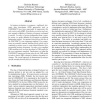Free Online Productivity Tools
i2Speak
i2Symbol
i2OCR
iTex2Img
iWeb2Print
iWeb2Shot
i2Type
iPdf2Split
iPdf2Merge
i2Bopomofo
i2Arabic
i2Style
i2Image
i2PDF
iLatex2Rtf
Sci2ools
ICDE
2007
IEEE
2007
IEEE
A UML Profile for Core Components and their Transformation to XSD
In business-to-business e-commerce, traditional electronic data interchange (EDI) approaches such as UN/EDIFACT have been superseded by approaches like web services and ebXML. Nevertheless, a precise and common semantic definition of business documents exchanged is needed. In order to become independent from a transfer syntax, we prefer defining the documents as platform independent models. An approach that follows this idea is the UN/CEFACT's core component standard. Core components are reusable semantic building blocks which can be combined in various ways to create shared libraries of interoperable business documents. In order to use standard UML modeling tools we have developed a UML profile for the core components standard. Furthermore, we adapt the UN/CEFACT naming and design rules for the UML profile in order to derive XML schemas for business document exchanges. The overall approach is demonstrated by using a specific example from the field of e-commerce. 1 Motivation The...
| Added | 16 Aug 2010 |
| Updated | 16 Aug 2010 |
| Type | Conference |
| Year | 2007 |
| Where | ICDE |
| Authors | Christian Huemer, Philipp Liegl |
Comments (0)

